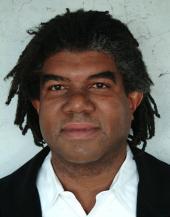Poet and Georgetown University professor Mark McMorris has been writing poetry for over two decades now, and it shows. His latest work, “The Book of Landings,” explores the form of lyric poetry, deconstructing and tampering with it with the skill only a veteran such as McMorris could possess. “The Book of Landings” is comprised of the second and third parts of his trilogy “Auditions for Utopia,” entitled “Fragments from a Time before This” and “City of Palimpsest.”
“Fragments from a Time before This” marks an enormous change in style from McMorris’s earlier work. It contains poems with striking visual elements, incorporating grids, drawings, arrows and various other geometrical elements into the work.
When asked about these visual elements, McMorris said he wished he could draw. “Whatever it is that prompts one to make a piece of art sometimes can’t be done in language…it could be realized in music, and it could be realized in painting, or drawing, if only one knew how to do those things!” He laughed, and elaborated that another reason he incorporated visuals into his poetry is that he sees drawing and visual art as less transient than language. “When you look at [a mark on paper], what you see is the movement of a hand and that brings you very close to the person that made the mark in the way that looking at a poem doesn’t. I’m envious.”
The visuals in McMorris’ poetry can arguably be seen as a way to give readers at least some of that same closeness. Examples can be found in the 12 Rectangles poems—a series of poems scattered throughout “Fragments” consisting of a 3×4 grid whose squares are filled with words whose connections are not immediately obvious, such as “souk,” “sextant” and “carrefour.” When asked he explained that the grids were, in part, one answer to the transience of lyric poetry. “You could say [the grids] imprison the words, they keep the words from fleeing, they arrest the word and fix it, pin it down, make it stop moving.” A few lines immediately after a 12 Rectangles piece reads, “the grid is a simplified speech / not all words survived the voyage/ to be present at our dialogue.”
He said the 12 Rectangles poems also serve as an “alphabet” for the whole collection, as the words he use reappear throughout the whole trilogy: “sextant,” for instance, appears in a lyric shortly after appearing in a grid: “I saw my love in a dungeon / Who gave me a sextant.” “You could say the words are traveling from the grids into the poems,” he added.
This travel, and the repetition of words, comes back to an oft-repeated theme in McMorris’ work. “Auditions for Utopia” is not really a narrative, but it repeatedly explores travel in different ways, all tying back to the idea of a search for the titular “Utopia,” connected in part to the impossible task of travelers or refugees to reestablish a lost homeland—“the desire to retrieve the thing that is lost.” When questioned if this utopia exists in the trilogy, he replied, “I don’t know that I’d still say that utopia doesn’t exist,” elaborating that the dream of utopia persists, even as it changes. The connections between this statement’s applicability to McMorris’ poetry and the real world are as blurred as the places where one of his poems ends and the other begins, as they bleed into one another, untitled, in “Fragments.”
His advice for aspiring poets at Wellesley? “Believe in yourself. I think it comes down to that,” he said, and then laughed. “It’s not wisdom, it’s just the most banal thing that Oprah Winfrey always says. You can get this in People Magazine. I don’t have any special way of putting it; I’m trying to say we each have our own way of going about things, whatever those commitments are. You want to see a certain kind of world, you want America to be a certain way, you have politics…..[and] poetry is one way of going about your politics. But you have to believe in yourself, and you have to listen to yourself, because you can get it wrong! You can think [your work] should be poetry, when it should be something else.”
Mark McMorris will be doing a reading from “The Book of Landings” this Thursday, Oct. 20, at 4:15 p.m. in the Zeta Alpha House.



